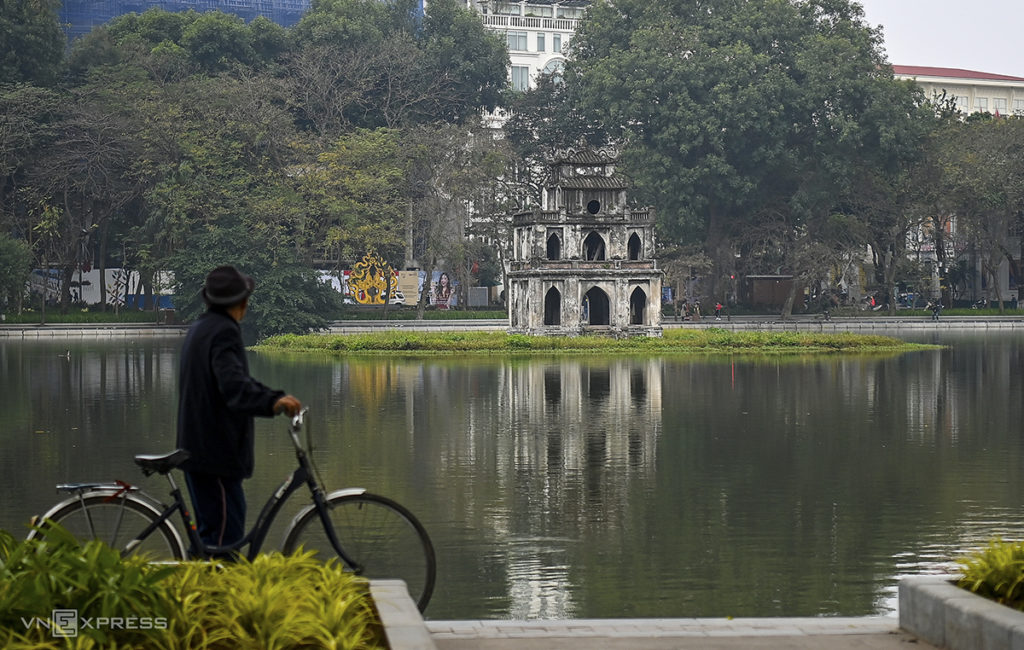The Zodiac calendar says the Year Of The Ox/Buffalo has arrived. But in Vietnam, despite the Tet Lunar New Year, the page has not turned and the Year Of COVID-19 stubbornly persists. The country is now battling hard against one of the virus’s most troublesome outbreaks.

Historically, Tet in Vietnam has had many complexions—from the cataclysmic rebel uprising during the American War in 1968, to the optimistically progressive outlook of two short years ago. Usually, Tet in Vietnam is like Christmas: a time for shopping, gift giving, feasting, celebrating with family and friends. This year, because of the coronavirus, Tet in Vietnam again looked different.
It was grim.

The streets, parks and malls of Ho Chi Minh City (Saigon; HCMC), home to some 13 million people, were virtually deserted. Normally bustling Hanoi locations such as legendary Hoan Kiem Lake, and Ta Hien–“Beer Street”– were empty to the point of appearing ghostly. Holiday gatherings were limited in size; travel from “epicenter’ areas was prohibited; national borders remained closed and incoming flights from abroad remained severely restricted. Bars, restaurants, karaoke clubs, sporting events and even religious services were either off-limits or restricted. Hanoi cut its fireworks shows from the planned 30 to one, and audiences were banned. Many other cities including HCMC cancelled traditional fireworks to prevent crowds from gathering.
“‘Chúc Tết’ means we go to visit family and friends during Tet,” said Trường Giang, a former tour guide from Hanoi. “But this year, because of a new outbreak, we have to stop it, and do it by phone.”
The latest outbreak of COVID-19 cases in Vietnam began on January 28 and has since risen to 775 in 13 cities and provinces. Hai Duong Province, near Hanoi in the north, is currently the country’s most infected epicenter; about 500 cases have been reported there. More than 150,000 people are currently quarantined for medical observation throughout the country. On Monday, a 54-year old Japanese businessman, found dead in his Hanoi hotel room, was confirmed as Vietnam’s 2,229th coronavirus patient. The nationwide COVID-19 tally is 2,347.
Though minuscule by comparison to the US and other countries which did not do as good a job containing the virus last year, Vietnam’s recent cases have health experts fearing the Tet outbreak could quickly turn into tens of thousands of casualties. To head off that possibility. the government has taken swift and stringent steps. Measures in effect in Hai Duong Province are typical of how Vietnam’s government has dealt with the pandemic since early last year. The central city is under the most exacting lockdown possible. Essential goods are allowed into the city, but non-essential travel is banned and most businesses and all schools are closed. Outdoor gatherings of more than two people are prohibited and residents have been ordered to remain in their homes except for food shopping or medical appointments. Screening checkpoints have been set up on roads.

When the virus emerged from China one year ago, Vietnam avoided the worst horrors of the global pandemic by reacting swiftly with such draconian measures. A country of more than 90 million people, Vietnam weathered most of 2020 with an enviable lower-than-most per capita infection rate. It’s death toll is a mere 35 persons.
The government requires isolation at home or at remote locations for most people who become infected. More than 22 million Vietnamese use a mobile contact-tracing app called BlueZone that does geo-tracking on their smart phones. Users are notified if they come within 6-feet of a COVID-19 patient or others who may have done so.
“Westerners probably would never accept [BlueZone] because it’s like a privacy violation,” says Trường. “But Vietnamese are ready to use this app to protect themselves.”
Despite Vietnam’s success in curtailing illness from the virus, the people of Vietnam have suffered socially and economically. Tourism, a lifeblood of the Vietnamese economy, remains devastated as Vietnam’s borders were quickly sealed—and remain so— except for the most urgent diplomatic, business and emergency family travel. Bankruptcies and unemployment are widespread among hotels, travel agencies, restaurants, right on down to souvenir street vendors. Meanwhile the Vietnamese government, which rode hard herd on social distancing and quarantining, has provided only perfunctory compensation to those most severely affected. Some residents were eligible for the equivalent of $50 per month for up to three months. Make no mistake, $50 goes far in Vietnam. But not forever.
“So many people are affected by this virus from street vendors to retail salespeople and others. But there is no support for them all,” said Khoa Nguyen, founder and director of In Country Tours in HCMC.

In the absence of widespread government assistance early on, wealthy entrepreneurs financed free-rice dispensers—so called “ATMs Gao”–for the most hard up citizens. That innovation was followed by “Free Mask ATMs.” But there remains plenty of displacement nonetheless. “Tour guides became Grab Bike drivers [the two-wheel motorbike equivalent to Uber taxis],” says Khoa.
In the Vietnamese Zodiac, the Buffalo/Ox is characterized as methodical and hard working. Based on the burdens of 2020 and early 2021, every bit of strength, diligence and oxen-like determination will be necessary to get Vietnam —and the rest of the world—back on a path to normalcy…if such a thing even remains a possibility in a post COVID-19 world.
